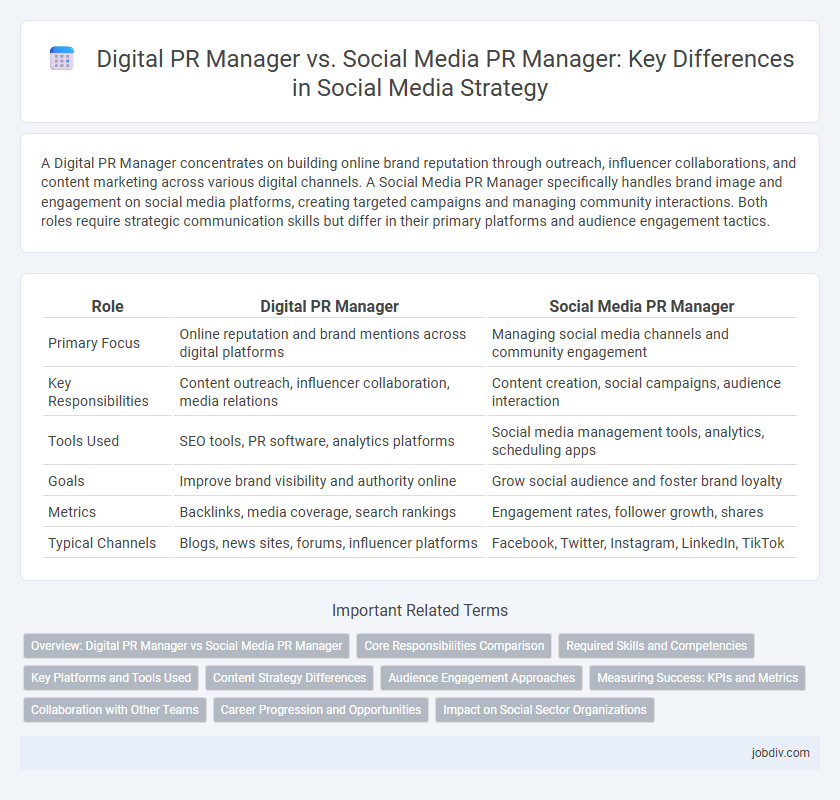A Digital PR Manager concentrates on building online brand reputation through outreach, influencer collaborations, and content marketing across various digital channels. A Social Media PR Manager specifically handles brand image and engagement on social media platforms, creating targeted campaigns and managing community interactions. Both roles require strategic communication skills but differ in their primary platforms and audience engagement tactics.
Table of Comparison
| Role | Digital PR Manager | Social Media PR Manager |
|---|---|---|
| Primary Focus | Online reputation and brand mentions across digital platforms | Managing social media channels and community engagement |
| Key Responsibilities | Content outreach, influencer collaboration, media relations | Content creation, social campaigns, audience interaction |
| Tools Used | SEO tools, PR software, analytics platforms | Social media management tools, analytics, scheduling apps |
| Goals | Improve brand visibility and authority online | Grow social audience and foster brand loyalty |
| Metrics | Backlinks, media coverage, search rankings | Engagement rates, follower growth, shares |
| Typical Channels | Blogs, news sites, forums, influencer platforms | Facebook, Twitter, Instagram, LinkedIn, TikTok |
Overview: Digital PR Manager vs Social Media PR Manager
Digital PR Managers specialize in enhancing brand visibility through online publications, influencer partnerships, and SEO-driven content strategies, focusing on broad digital outreach beyond social platforms. Social Media PR Managers concentrate on managing brand reputation and engagement across social channels like Facebook, Instagram, and Twitter, crafting tailored content and community interaction. Both roles require strong communication skills but differ in scope, with Digital PR emphasizing media relationships and organic search presence, while Social Media PR targets direct audience engagement and platform-specific campaigns.
Core Responsibilities Comparison
Digital PR Managers focus on managing online reputation, securing digital media coverage, and developing content strategies for websites and blogs. Social Media PR Managers handle social media platforms by engaging audiences, monitoring social conversations, and executing campaigns to boost brand presence on channels like Facebook, Instagram, and Twitter. Both roles require strategic communication skills, but Digital PR emphasizes earned media and influencer outreach while Social Media PR centers on real-time interaction and community management.
Required Skills and Competencies
Digital PR Managers require expertise in SEO, content strategy, and analytics to enhance brand visibility across digital channels, while Social Media PR Managers specialize in community engagement, platform-specific content creation, and real-time reputation management. Both roles demand strong communication, crisis management abilities, and proficiency in digital tools, but Digital PR leans more towards technical skills like link-building and data interpretation. Social Media PR focuses on interactive campaigns, trend analysis, and audience insight to foster brand loyalty and drive social interactions.
Key Platforms and Tools Used
Digital PR Managers primarily utilize platforms like Google Analytics, SEMrush, and Ahrefs to monitor online presence, optimize SEO strategies, and manage media outreach across blogs and digital publications. Social Media PR Managers focus on social platforms including Facebook, Instagram, LinkedIn, and Twitter, using tools such as Hootsuite, Sprout Social, and Buffer to schedule posts, engage audiences, and track social media performance. Both roles leverage analytics and CRM software but differ significantly in their channel emphasis and tools tailored for content dissemination and audience interaction.
Content Strategy Differences
Digital PR Managers prioritize creating and distributing content that builds brand authority through online publications, influencer collaborations, and SEO-driven press outreach. Social Media PR Managers focus on developing real-time, engaging content that enhances brand presence and community interaction across platforms like Instagram, Twitter, and Facebook. The key difference lies in Digital PR's emphasis on earned media and backlinks, while Social Media PR centers on direct audience engagement and viral content creation.
Audience Engagement Approaches
Digital PR Managers leverage targeted online campaigns, influencer collaborations, and SEO strategies to boost brand visibility and drive audience engagement through earned media. Social Media PR Managers focus on real-time interaction, content curation, and community management across platforms like Instagram, Twitter, and Facebook to foster direct connections and amplify brand narratives. Both roles employ analytics tools to measure engagement metrics, but Digital PR emphasizes external reputation-building while Social Media PR prioritizes ongoing audience dialogue.
Measuring Success: KPIs and Metrics
Digital PR Managers measure success through media coverage, website traffic, and backlinks to improve brand authority and SEO rankings. Social Media PR Managers focus on engagement rates, follower growth, and share of voice across platforms to gauge audience interaction and campaign reach. Both roles utilize sentiment analysis and conversion tracking to align PR efforts with overall business objectives.
Collaboration with Other Teams
Digital PR Managers coordinate closely with marketing, content, and SEO teams to amplify brand messaging through earned media and strategic digital placements. Social Media PR Managers collaborate primarily with social media specialists, community managers, and customer service teams to engage audiences, manage brand reputation, and drive real-time communication. Both roles emphasize cross-functional teamwork to ensure consistent messaging and maximize public relations impact across digital channels.
Career Progression and Opportunities
Digital PR Managers typically oversee online reputation management, influencer collaborations, and content strategies across digital platforms, offering broader career progression into roles like Chief Marketing Officer or Digital Communications Director. Social Media PR Managers specialize in crafting social media campaigns, community engagement, and real-time brand interaction, providing pathways into Social Media Director or Brand Manager positions. Both roles offer distinct opportunities for leadership growth but differ in scope, with Digital PR encompassing wider digital marketing integration and Social Media PR focusing on platform-specific audience engagement.
Impact on Social Sector Organizations
Digital PR Managers enhance social sector organizations' visibility by leveraging online media, influencer partnerships, and targeted campaigns to amplify mission-driven narratives. Social Media PR Managers focus on real-time engagement, content creation, and community management, fostering direct interaction with supporters and beneficiaries. Both roles drive social impact but differ in strategy, with Digital PR emphasizing broad digital presence and Social Media PR prioritizing interactive platform-based relationships.
Digital PR Manager vs Social Media PR Manager Infographic

 jobdiv.com
jobdiv.com